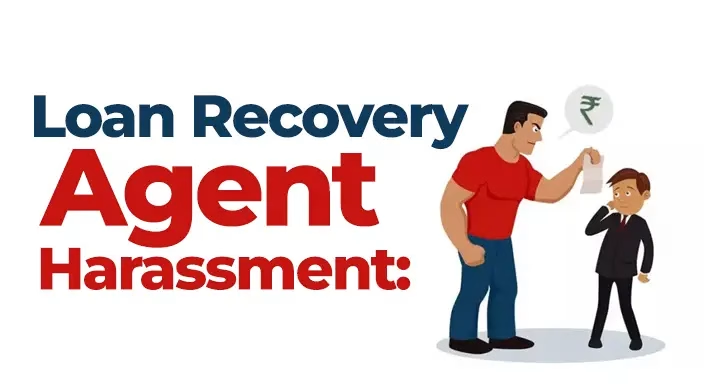Introduction
In India, the issue of loan recovery agent harassment has become increasingly prevalent. Many borrowers find themselves facing intimidation, harassment, and illegal recovery tactics from banks, non-banking financial companies (NBFCs), and third-party collection agencies. Such actions not only violate the rights of borrowers but also undermine ethical loan recovery practices. To combat this, the Reserve Bank of India (RBI) has established strict guidelines to regulate the conduct of loan recovery agents. Furthermore, various laws, including the Bhartiya Nyay Sanhita (BNS) and the Consumer Protection Act, provide borrowers with essential legal protections against such misconduct.
In this blog post, we will explore the legal framework surrounding loan recovery agent harassment, the rights of borrowers, relevant RBI guidelines, provisions of the BNS, and case laws that shed light on this critical issue.
1. Understanding Loan Recovery Agent Harassment
Loan recovery agent harassment encompasses a range of unethical and illegal practices employed by financial institutions and collection agencies. Common forms of harassment include:
(i) Unlawful Threats & Intimidation
- Threatening borrowers with false legal consequences, such as police action or property seizure.
- Using abusive language to pressurize borrowers into repayment.
(ii) Repeated & Unreasonable Calls
- Making excessive phone calls, especially during odd hours (late night or early morning).
- Contacting family members or workplace colleagues to defame or coerce the borrower.
(iii) Physical Harassment & Unethical Personal Visits
- Visiting borrowers’ homes or workplaces without prior notice.
- Engaging in physical intimidation or harassment.
(iv) Public Shaming & Defamation
- Posting defaulter details publicly, violating the right to privacy.
- Sending false legal notices without adhering to due process.
(v) Unauthorized Freezing of Bank Accounts & Asset Seizure
- Blocking bank accounts without prior notice as mandated by the RBI.
- Illegally repossessing vehicles or property without following proper recovery procedures.
2. Borrowers’ Legal Rights Against Harassment
Borrowers in India are protected under various laws, including the Bhartiya Nyay Sanhita (BNS), RBI Guidelines, the Consumer Protection Act, and the Indian Constitution.
(i) Protection Under Bhartiya Nyay Sanhita (BNS) 2023
- Section 349 BNS – Criminal Intimidation
- Threatening borrowers with false consequences can lead to up to two years imprisonment or fines.
- Section 351 BNS – Intentional Insult with Intent to Provoke Breach of Peace
- Using abusive language is a criminal offense.
- Section 354 BNS – Outraging Modesty of a Woman
- Harassment of female borrowers can result in punishment of up to five years imprisonment.
- Section 358 BNS – Assault or Use of Criminal Force
- Physical intimidation by recovery agents is subject to criminal charges.
- Section 503 BNS – Wrongful Confinement
- Illegal confinement or threats can result in legal action against recovery agents.
(ii) Rights Under the Consumer Protection Act, 2019
- Unfair trade practices by banks or NBFCs can be penalized, and borrowers have the right to file complaints in Consumer Courts.
(iii) Constitutional Rights
- Article 21 guarantees the right to life and personal liberty, including protection against harassment.
(iv) Protection Under the RBI Guidelines
The RBI Guidelines on Fair Practices Code for Lenders (2022-23) outline rules for ethical loan recovery:
- No Harassment or Coercion
- Banks are prohibited from threatening borrowers.
- Restricted Calling Hours
- Calls can only be made between 8 AM and 7 PM.
- Prior Written Notice Before Recovery
- Banks must issue a written warning before sending agents.
- Mandatory Agent Identification
- Agents must carry identification and cannot impersonate law enforcement.
- No Public Shaming
- Banks cannot publish borrower details publicly.
- Legal Process for Asset Seizure
- Prior notice and legal approval are required before any repossession.
- Complaint Redressal System
- Borrowers can lodge complaints with the Banking Ombudsman.
3. How to File a Complaint Against Loan Recovery Agent Harassment?
Step 1: Lodge a Complaint with the Bank/NBFC
- File a written complaint with the bank and keep a copy for your records.
Step 2: File a Complaint with the RBI Banking Ombudsman
- Use the online complaint link: RBI Complaint Portal.
Step 3: Register an FIR with the Police
- File a police complaint under Sections 349, 351, 503, and 358 of the BNS.
Step 4: Approach the Consumer Court
- If the harassment affects your financial or mental well-being, file a case in the Consumer Forum.
Step 5: File a Writ Petition in High Court
- If harassment persists, consider filing a writ petition to challenge the unfair practices.
4. Landmark Case Laws on Loan Recovery Agent Harassment
(i) ICICI Bank Ltd. v. Shanti Devi Sharma (2008)
- The Supreme Court ruled that recovery agents cannot use force or threats.
(ii) Prithvi Raj v. SBI & Others (2019)
- The Delhi High Court held that banks must adhere to RBI guidelines in recovery proceedings.
(iii) Nishant Choudhary v. HDFC Bank (2022)
- A Consumer Forum ordered compensation to the borrower due to illegal harassment.
(iv) D. K. Basu v. State of West Bengal (1997)
- The Supreme Court upheld the Right to Dignity and ruled against unlawful detention or threats.
5. Preventive Measures for Borrowers
- Keep all loan documents and notices safe to dispute unlawful claims.
- Request written communication instead of relying on verbal agreements.
- Record phone calls and personal visits as evidence.
- Avoid signing blank cheques or documents under pressure.
- File complaints immediately if harassment occurs.
6. Conclusion
Loan recovery harassment is a serious issue that affects many borrowers. However, legal protections under the BNS, RBI Guidelines, Consumer Protection Act, and Supreme Court rulings empower individuals to take action against such misconduct. If you or someone you know is facing harassment from recovery agents, it is crucial to take legal action promptly.
For legal assistance, visit www.advocateadarsh.com or contact Advocate Adarsh Singhal for expert guidance. Let’s stand together against harassment and protect our rights as borrowers!

